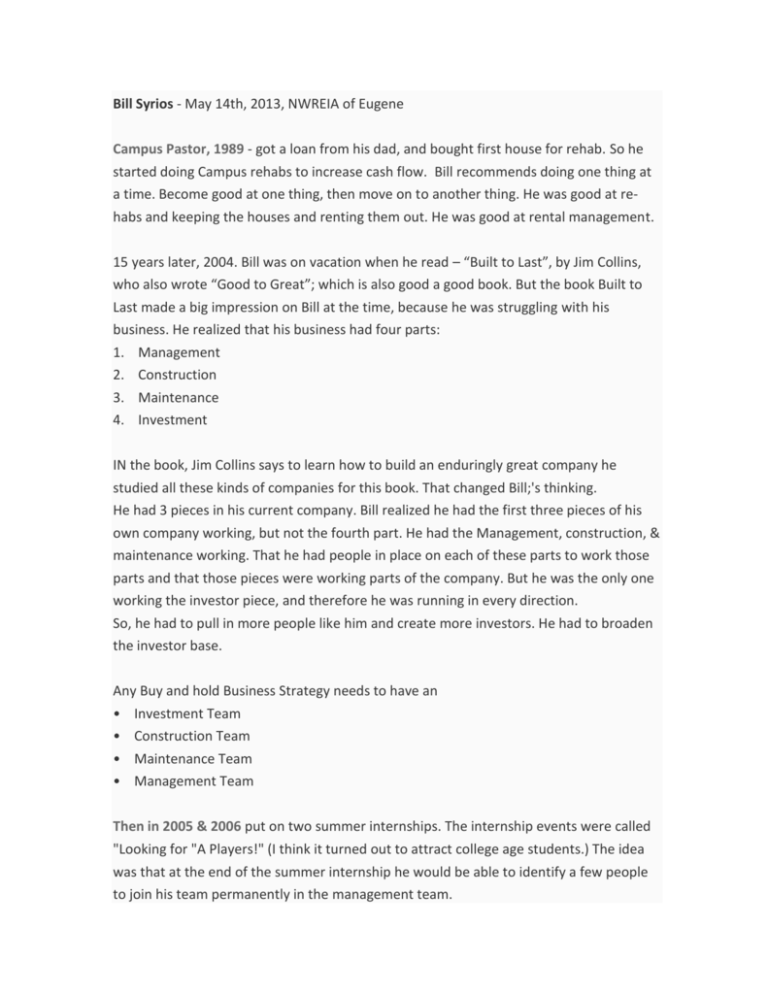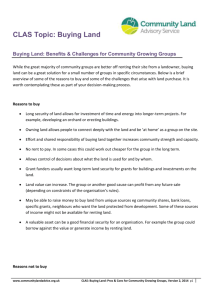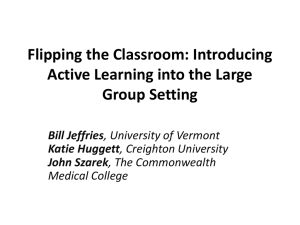Bill Syrios - May 14th, 2013, NWREIA of Eugene Campus Pastor
advertisement

Bill Syrios - May 14th, 2013, NWREIA of Eugene Campus Pastor, 1989 - got a loan from his dad, and bought first house for rehab. So he started doing Campus rehabs to increase cash flow. Bill recommends doing one thing at a time. Become good at one thing, then move on to another thing. He was good at rehabs and keeping the houses and renting them out. He was good at rental management. 15 years later, 2004. Bill was on vacation when he read – “Built to Last”, by Jim Collins, who also wrote “Good to Great”; which is also good a good book. But the book Built to Last made a big impression on Bill at the time, because he was struggling with his business. He realized that his business had four parts: 1. 2. 3. 4. Management Construction Maintenance Investment IN the book, Jim Collins says to learn how to build an enduringly great company he studied all these kinds of companies for this book. That changed Bill;'s thinking. He had 3 pieces in his current company. Bill realized he had the first three pieces of his own company working, but not the fourth part. He had the Management, construction, & maintenance working. That he had people in place on each of these parts to work those parts and that those pieces were working parts of the company. But he was the only one working the investor piece, and therefore he was running in every direction. So, he had to pull in more people like him and create more investors. He had to broaden the investor base. Any Buy and hold Business Strategy needs to have an • Investment Team • Construction Team • Maintenance Team • Management Team Then in 2005 & 2006 put on two summer internships. The internship events were called "Looking for "A Players!" (I think it turned out to attract college age students.) The idea was that at the end of the summer internship he would be able to identify a few people to join his team permanently in the management team. Now he not only had office with properties in Eugene, but he also had properties in Salem, and Portland with management offices in each city. He marketed in each city with guerrilla marketing and newspaper ads. There was the big sign, and A House Truck. "Save the Commission" - A three line ad in the Register Guard - was the best marketing he ever did. Then in 2007 and 2010 the market was in free fall so he did Short sales, and he flipped, and flipped and flipped nearly 200 houses. Then by 2010 Bill says he got restless. 2011. & presently Stewardship Properties is back into the “Buy and Hold” Strategy. Gone are the days of flipping and certainly looking for short sales are over. They have a company in in Kansas City, MO and one in Dallas, TX. Hi personal philosophy is “The person with the most debt wins”. It’s not the person with the most toys wins. He rephrases his philosophy: “That is the person with the most GOOD debt wins.” Why sell anything that is good debt, which has cash coming in? Bill says to find your cookie cutter mold. Focus on what makes you money and do it over and over again. Cash flow and money and loans is what is in the middle of your buy and hold strategy. He presented the Stewardship Properties video on Kansas City Properties, which shows that the business plan is to buy in certain neighborhoods in KC on value priced housing; such as HUD foreclosures and other REO properties. They put in their offers low and about 10% of the offers eventually are accepted. For example, a $20,000 offer was held close and tight until the bank was ready to negotiate. They eventually bought the house for only $26,000. They fixed it up and have $30,000 into it all together. The rent is around $750. The Kansas City market is stable. KC is the major intersection between Dallas and Chicago. The unemployment rate is 6%. They have been buying houses at their historic low prices. Strategy: Be in the middle of the market. Where is your market? What is the value play of your market? Some people buy properties on the corner so they can turn it into duplex. Campus Rental Properties can be a value play if you can increase the numbers of bedrooms. IN Kansas City their Rent to cost ratio is: • 2.03 • 2.18 • 3.16 Bu in Eugene a likely rent to cost ratio is .76% It’s difficult to get 1% here. (Traditional evaluation is 1%, but it is not available here so much on the west coast.) Except in the Midwest you can find better than that. However in parts of the market, like war zones, you can get better return, but the risk is great. So the next value spot is the C market, the rent is higher and the cost is higher, but the good deals are there. They are more difficult to find, - these are called value play properties. That’s where the cash flow intersects with the Bill had borrowed money from day one from private lenders. First from his dad, then from associates he knew well, then from others that were interested in Another book Bill recommends you read is Gary Keller’s Millionaire Real Estate Investor you have to read this book, and his other books. This should be the book you first read. (Like as Keller Williams Real Estate.) Questions and Answers: Q: How did you assess the rents in in the KC market, since you didn't live there? A: Bill saw the rates they were renting at, and saw the sold prices. Bill has seen so many people lose money by not having the management piece figured out in the market out of state. In management is where you lose your shirt if you don't manage it yourself. There are others in KC that are offering low in KC, but Cash is king, so Stewardship Props has built up their private money lenders list. Q: If prices are so great in KC, why are people renting rather than buying? A: People are renting, rather than buying in KC because they don’t have the ability or faith to borrow and buy their own house. Q: Do you have a hold strategy for how long you are going to be in Kansas City? A: Bill's axiom as a buy and hold strategy is why would he ever sell as long as he doesn't need the money? So, “no”. Q: Why aren’t you flipping anymore? A: Buying and flipping is a complex operation in comparison. Because you have to be so good at buying, negotiating, rehabbing, construction, and selling. (And he already answered the reason to hold.) Q: Do you have all your properties in a trust? A: Yes, because then your kids avoid probate. Then they immediately own the trust. The inheritance tax level is not so bad for the Federal (US), but in Oregon, it's very low, like $1 million. At a million dollars of inheritance, you have to pay a large amount of tax in Oregon. Competing in the retail market: IN the beginning it was very easy to get houses very low. Then the prices went up. The construction crew was unskilled then, but now the crews are much better. Now there more people in the market and the great deals are further and farther between. But the good deals are there. The market is good. Low interest rates are fueling the market activity. Prices are still 30% below the balloon rate. There is a lot of pinned up demand. The low might have passed, but the prices are still good. 2012 last quarter, in Lane County the average house sold for $207,000 and now it's selling for $223,000 - average price. So prices are increasing. Remember the cash flow needs to warrant the loan. The value of the property needs to warrant the loan. Q: Where do you find the great deals? A lot of sources: . 1. Marketing: 2. Fliers on doors, 3. Ads in the paper, 4. Talk to everyone. In KC they are using a broker to buy 90% of their houses. Andrew drives around with this broker 3 days a week. They use a “find and investment (investor) minded broker”. He/she will understand that you are not a one-time sale. They will have to make a lot of offers for you, and will eventually win a sale, and there will be another sale and another. Side note: Liz Kramer says was this kind of broker for a particular client, which is why she is able to retire like she can now. REO- properties - it's a mystery what a bank will accept. Private lenders sometimes want comps, wants insurance, wants the DEED. So, they usually want the first position mortgage/deed, but sometimes they will take the 2nd, and not get the deed. Sellers also offer financing "Seller Carry Back", also called "A Wrap" when there is a mortgage already and you are paying the mortgage for them. The paper work is the easy part about the process, the escrow agent (or your lawyer) is going to be part of your team, and take care of the paper work. The End. If you’d like more information on this topic: You can contact Bill Syrios at 541-221-4242, Stewardship Properties of Eugene, OR. Email:Bill@stewardshipllc.com If you’d like more information on education at Northwest REIA of Eugene, contact Grace Widdicombe at 541-554-4633, or email: grace@gratefulnuts.com



